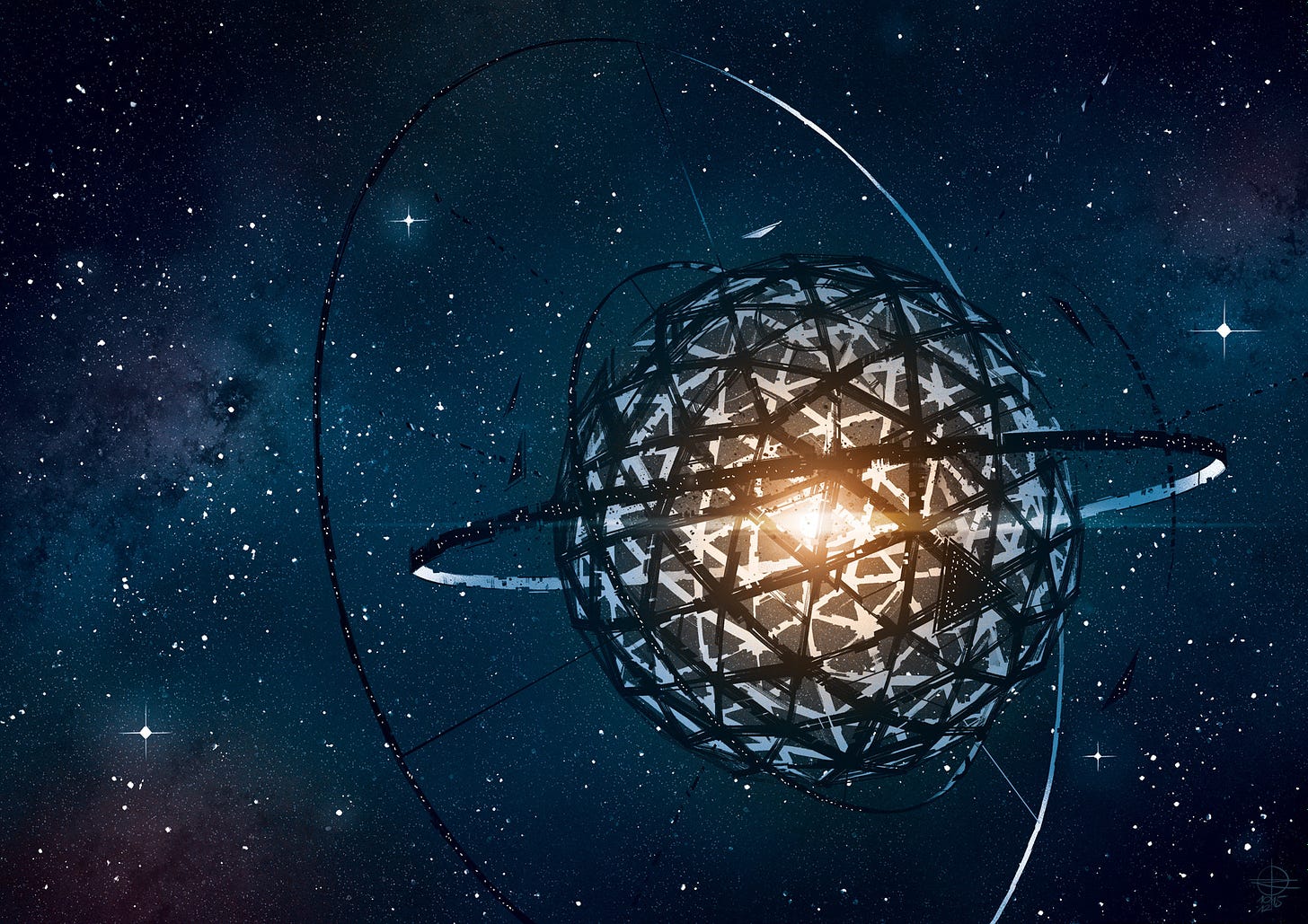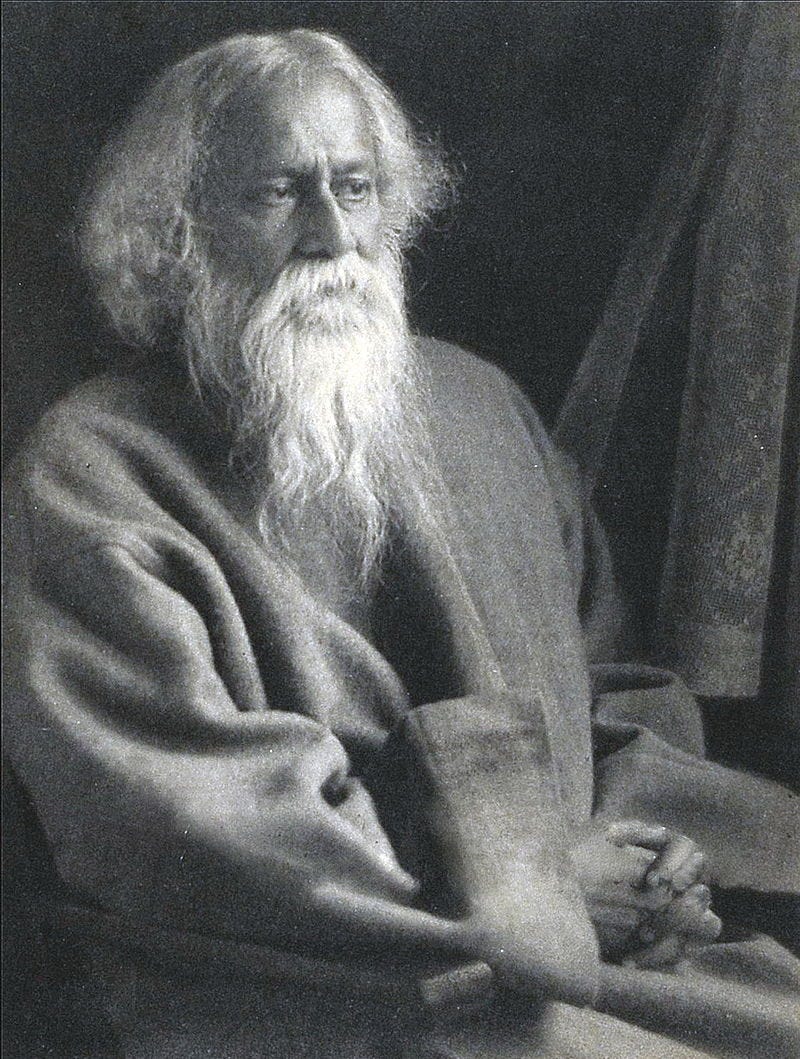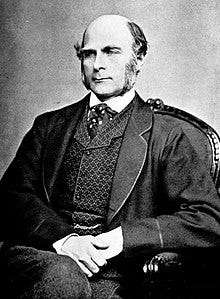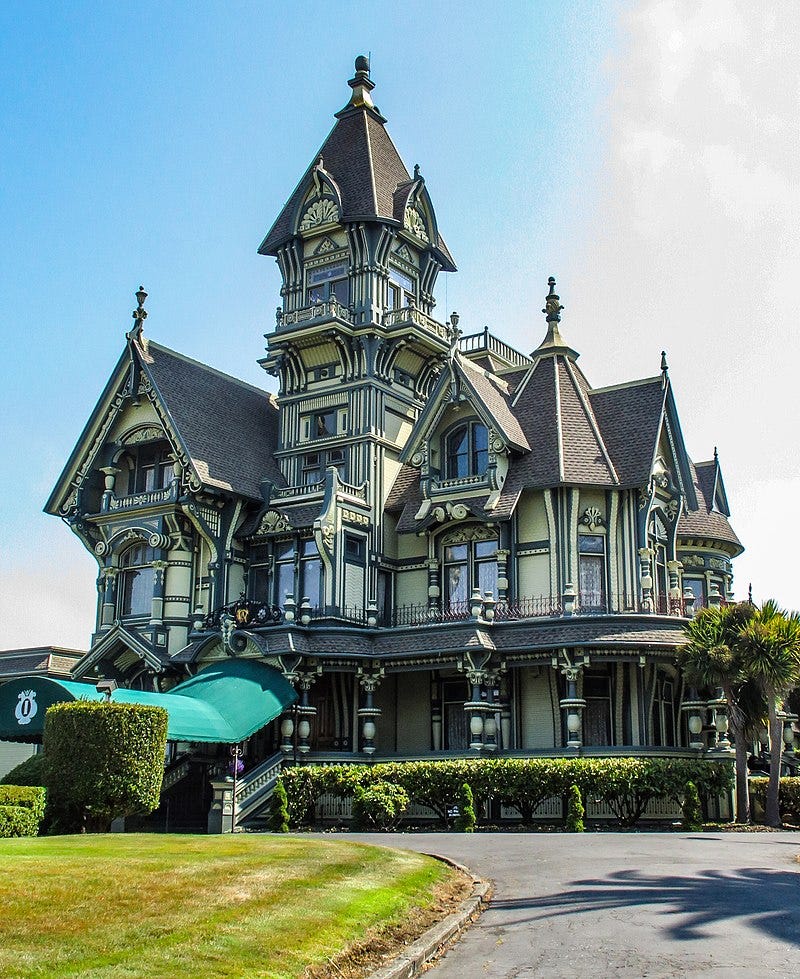Secrets Of The Great Families
I.
Let’s talk impressive families.
Aldous Huxley was an author most famous for Brave New World , though his other stuff is also great and underappreciated. His brother Julian Huxley founded UNESCO and the World Wildlife Fund and coined the terms “ethnic group”, “cline”, and “transhumanism”. Their half-brother Andrew Huxley won the Nobel Prize in Medicine for discovering how nerves work. Their grandfather was Thomas Huxley , one of the first and greatest advocates of evolution, and President of the Royal Society.
Henri Poincare was a great mathematician, credited with pioneering chaos theory and topology. The Poincare Institute, Poincare Prize, and the Poincare Crater on the moon are all named after him. His cousin, Raymond Poincare , was president of France from 1913 to 1920. Raymond’s brother, Lucien Poincare , was a distinguished physicist, and head of the University of Paris.
Charles Darwin discovered the theory of evolution. His grandfather Erasmus Darwin also groped towards some kind of proto-evolutionary theory, made contributions in botany and pathology, and founded the influential Lunar Society of scientists. His other grandfather Josiah Wedgwood was a pottery tycoon who “pioneered direct mail, money back guarantees, self-service, free delivery, buy one get one free, and illustrated catalogues” and became “one of the wealthiest entrepreneurs of the 18th century”. Charles’ cousin Francis Galton invented the modern fields of psychometrics, meteorology, eugenics, and statistics (including standard deviation, correlation, and regression). Charles’ son Sir George Darwin , an astronomer, became president of the Royal Astronomical Society and another Royal Society fellow. Charles’ other son Leonard Darwin , became a major in the army, a Member of Parliament, President of the Royal Geography Society, and a mentor and patron to Ronald Fisher, another pioneer of modern statistics. Charles’ grandson Charles Galton Darwin invented the Darwin-Fowler method in statistics, the Darwin Curve in diffraction physics, Darwin drift in fluid dynamics, and was the director of the UK’s National Physical Laboratory (and vaguely involved in the Manhattan Project).
Niels Bohr developed the modern understanding of the atom, for which he won the Nobel Prize in Physics. His father, Christian Bohr , discovered the Bohr effect in hematology. His brother, Harald Bohr , was both a great mathematician in his own right, and one of Denmark’s top football players; he led the team to a silver medal in the Olympics, and “when he defended his doctoral thesis the audience was reported as having more football fans than mathematicians”. Niels’ son Aage Bohr won another Nobel Prize in Physics, his other son Ernest Bohr was another Olympic athlete, and his grandson Tomas Bohr was another physics professor.
Gavin Newsom is currently Governor of California. He is a distant cousin of singer Joanna Newsom , and great-grandson of Thomas Addis , who pioneered the field of nephrology and helped discover the cause of haemophilia. He is some relation I cannot quite track (great-great-grandson?) of Samuel and Joseph Newsom , whose Newsom and Newsom firm of architects created some of the grandest buildings in San Francisco and beyond (most famously the Carson Mansion).
Marie and Pierre Curie discovered radioactivity and won the Nobel Prize. Their daughter Irene Curie also won a Nobel in chemistry. Their other daughter, Eve Curie , is described on her Wikipedia page as “the only member of her family who did not win a Nobel Prize” - but her husband, Henry Labouisse, did win a Nobel Prize (Peace, for his work in UNICEF). Marie and Pierre’s granddaughter, Helene Joliot-Curie , is a professor of nuclear physics and former president of the French Rationalist Union; their grandson Pierre Joliot-Curie is a biology professor and Director of Research at the French National Center for Scientific Research.
Freeman Dyson was a legendary physicist at Princeton’s Institute for Advanced Studies, known for inventing Dyson’s transform, the Dyson series, and of course the Dyson sphere. His father, Sir George Dyson was a well-known British composer and director of the Royal College of Music. His daughter Esther Dyson is a venture capitalist who has apparently been called “the most influential woman in all the computer world” even though I have never heard of her. His son George Dyson is a historian of science.
 Inscribed along the circumference: “THE FATHER OF THE GUY RESPONSIBLE FOR THIS WROTE SOME REALLY GOOD SYMPHONIES”
Inscribed along the circumference: “THE FATHER OF THE GUY RESPONSIBLE FOR THIS WROTE SOME REALLY GOOD SYMPHONIES”
Rabindranath Tagore was an Indian poet and philosopher who won the Nobel Prize in Literature. His father Debendranath Tagore founded a new religion, Brahmoism, which apparently has several million adherents although I have never heard of it. His brother Dwijendranath Tagore was a prominent scholar, translator, composer, and mathematician. His other brother Satyendranath Tagore was the first Indian to make it into Britain’s colonial Indian Civil Service. His other brother Hemendranath Tagore was a physicist who experimented with radio waves (in the 1860s!) and wrote “the first scholarly Asian work on physics”, as well as being a “renowned wrestler”. His nephew Abanindranath Tagore was a famous artist and the founder of the Indian Society of Oriental Art. His…okay, look, just assume there are an approximately infinite number of Tagores, all of whom have names ending in -dranath, and all of whom have some set of amazing accomplishments in music, art, literature, occasionally science or politics. You can see a list of some of them here, but bring a flashlight and remember to drop bread crumbs behind you, or else you’ll never find your way back.
 Getting a strong “my family has a history of founding religions and I might found a new one at any moment” vibe from this guy.
Getting a strong “my family has a history of founding religions and I might found a new one at any moment” vibe from this guy.
How do these families keep producing such talent, generation after generation?
II.
One obvious answer would be “privilege”. It’s not completely wrong; once the first talented individual makes a family rich and famous, it has a big leg up. And certainly once the actual talent in these families burns out, the next generation becomes semi-famous fashion designers and TV personalities and journalists, which seem like typical jobs for people who are well-connected and good at performing class, but don’t need to be amazingly bright. Sometimes they become politicians, another job which benefits from lots of name recognition.
But I’ve tried to avoid mentioning these careers, and focus on actually impressive achievements that are hard to fake. And also, none of these families except the Tagores were fantastically rich; there are thousands or millions of families richer than they are who don’t have any of their accomplishments. For example, Cornelius Vanderbilt’s many descendants are famous only for being very rich and doing rich people things very well (one of them won a yachting prize; another was an art collector; a third was Anderson Cooper).
III.
The other obvious answer is “genetics!” I think this one is right, but there are some mysteries here that make it less of a slam dunk.
First, don’t genetics dilute quickly? You only share 6.25% of your genes with your great-great-grandfather. But Charles Galton Darwin was a brilliant and distinguished scientist, and his great-grandfather Erasmus Darwin was also a brilliant and distinguished scientist. Can 6.25% of the genome really do that much work?
We can formalize this objection using IQ, which is nice and quantifiable. Suppose Erasmus Darwin had a genius-level IQ of 150. And suppose that he tried very hard to marry a bright woman, and his screening mechanism was as successful as the Ivies or Oxbridge when they screen for bright people - in that case his wife would have the same IQ as an average Ivy Leaguer, maybe 130ish. We would predict their average child to have an IQ of 124. Why is the average lower than either parent? Regression to the mean - IQ is probably a combination of genes and random factors, and if your IQ is very high it means you probably have a combination of good genes and good random dice rolls, and even though you can pass on the good genes your kids will probably only get average dice rolls.
But 124 isn’t even as high as the average Ivy Leaguer. If that IQ 124 kid marries another IQ 130 spouse, things deteriorate less quickly - I think the regression process has selected for his 24 IQ point advantage over average being entirely genetic, so it’s not going to regress further. But his spouse’s IQ can still regress further, so they’ll probably end up with a kid who has an IQ somewhere in the high 110s or low 120s - for comparison, not much higher than the average Ashkenazi Jew. Maintaining a super-high-IQ family over several generations is really hard!
And the second problem is: what gene do we think Niels and Harald Bohr shared that made one of them a physics Nobelist and the other an Olympic athlete? What gene did Henri and Raymond Poincare share that made one of them a math genius and the other President of France? What gene did George and Freeman Dyson share that made one of them a great composer and the other a quantum physicist? The gene for excellence? Seems suspicious.
I think these challenges are at least partly answerable.
The answer to the first question is really impressive assortative mating and having vast litters of children.
Take Niels Bohr. He’s a genius, but if he marries a merely does-well-at-Harvard level woman, his son will be less of a genius. But in fact he married Margrethe Nørlund. It’s not really clear how smart she was - she was described as Bohr’s “sounding-board” and “editor”, and that can hide a wide variety of different levels of contribution. But her brother was Niels Nørlund, a famous mathematician who invented the Nørlund–Rice integral and apparently got a mountain range named after him. He may have been the most mathematically gifted person in Denmark who was not himself a member of the Bohr family - so marrying his sister is a pretty big score on the “keep the family genetically good at math” front.
The Darwins were even more selective: they mostly married incestuously among themselves. Charles Darwin married his cousin Emma Wedgwood; Charles’ sister Caroline Darwin married her cousin Josiah Wedgwood III; their second, cousin, Josiah Wedgwood IV, married his cousin, Ethel Bowen (and became a Baron!)
 Darwin family member Francis Galton, inventor of eugenics, who presumably felt very conflicted about all this cousin-marrying
Darwin family member Francis Galton, inventor of eugenics, who presumably felt very conflicted about all this cousin-marrying
When the Darwins weren’t marrying each other, they were marrying others of their same intellectual caliber. There is at least one Darwin-Huxley marriage: that would be George Pember Darwin (a computer scientist, Charles’ great-grandson) and Angela Huxley (Thomas’ great-granddaughter) in 1964. But also, Margaret Darwin (Charles’ granddaughter) married Geoffrey Keynes (John Maynard Keynes’ brother, and himself no slacker - he pioneered blood transfusion in Britain). And John Maynard and Geoffrey’s sister, Margaret Keynes, married Archibald Hill, who won the Nobel Prize in Medicine. And let’s not forget Marie Curie’s daughter marrying a Nobel Peace Prize laureate.
(another famous Darwin in-law is Edward Pease, whose book I reviewed here)
If you find yourself marrying John Maynard Keynes’ brother, or Niels Nørlund’s sister, or future Nobel laureates, you’re going way above the bar of “just as selective as Harvard or Oxford”. In retrospect, maybe it was stupid of me to think these people would settle so low.
But also, all these people had massive broods, or litters, or however you want to describe it. Charles Darwin had ten children (insert “Darwinian imperative” joke here); Tagore family patriarch Debendranath Tagore had fourteen.
I said before that if an IQ 150 person marries an IQ 130 person, on average their kids will have IQ 124. But I think most of these people are doing better than IQ 130. I don’t know if Charles Darwin can find someone exactly as intelligent as he is, but let’s say IQ 145. And let’s say that instead of having one kid, they have 10. Now the average kid is 129, but the smartest of ten is 147 - ie you’ve only lost three IQ points per generation. And if you’re marrying other people from very smart families - not just other very smart people - then they might have already chopped off the non-genetic portion of their intelligence and won’t regress. This is starting to look more do-able.
What about the second question? Why does “talent” run in families but express itself in such different ways?
Let’s start with the Dysons. Lots of studies show correlations between IQ (especially the nonverbal IQ which is helpful for math) and musical ability, usually around 0.2 (1, 2, 3). Their tests for musical ability are usually really simple things like pitch recognition, so plausibly complicated things like being a great composer are even more g-loaded.
What about the Poincares? Is political success g-loaded? There’s actually a great study on this! Sweden makes everyone take an IQ test as part of their mandatory military service, and if you ask the military very nicely they will give you people’s results. A team of researchers got the IQ tests of all Swedish politicians, leading to the following table:
 The cognitive test has a mean of 5 and an SD of 2, so a cognitive score of 7 = IQ 115, and a score of 9 = IQ 130+. I think. I don’t know how the ceiling effects here are supposed to work.
The cognitive test has a mean of 5 and an SD of 2, so a cognitive score of 7 = IQ 115, and a score of 9 = IQ 130+. I think. I don’t know how the ceiling effects here are supposed to work.
Not only do politicians have higher IQs than the general population, but the higher you go in politics (from nominated, to city council, to mayor, to member of Parliament), the higher your IQ! Members of Parliament average 6.7 on this test, which I think equals IQ 115 - not as high as Ivy Leaguers, but still well above average. So the same intellectual skills that made Henri a great mathematician could have helped Raymond become Prime Minister.
But what about the Bohrs? Vestberg et al use some kind of special snowflake cognitive tests instead of normal IQ, but their result is still pretty clear - as Wired puts it, Elite Soccer Players Are Smarter Than You Are - “and the sharpest of them score more often than dimmer teammates.” Since Harald Bohr was a soccer player, this sort of checks out.
I’m still pretty weirded out by this; even granted that soccer talent and mathematical talent are correlated at above zero, it can’t be that high a correlation, can it? But I guess this is why the Bohrs are Olympic athletes but Grigori Perelman isn’t. Whatever.
Does this mean in some sense that talented people can choose their field? If Henri got tired of math, could he have gone into politics, given that he apparently had some Generic Talent Genes that were pretty good for politics too?
Here I can only give personal anecdote - while it would be hubris to compare one’s self to Poincares or Darwins, I’m pretty proud of my own family. My brother and I both have Wikipedia pages - mine redirects to a page about my blog, his focuses on his career as a musician. If we were judging ourselves by the same standards we judge Darwins and Huxleys, we might assume that we both got some share of Generic Talent Genes, he focused on music, and I focused on writing. But in fact I tried really hard to be good at music and failed, badly. I don’t have that talent and I can’t develop it. I can imagine Henri feeling the same way if he tried to go into politics, or Raymond into math. Maybe they both got a big heap of Generic Talent Genes, plus some other genes that helped them specifically apply their talent to one field or another.
IV.
So much for genetics. Is there anything else these families did right?
I was hoping to find evidence that the distinguished parents home-schooled or otherwise taught or made apprentices of their children, but this is pretty conflicting. Charles Darwin went to boarding school; he was later apprenticed as a doctor to his father, but I’m not sure how much effect that had on him. Rabindranath Tagore’s childhood was just weird:
As a child, Tagore lived amidst an atmosphere where literary magazines were published, musical recitals were held, and theatre performed. The Jorasanko Tagore were indeed at the center of a large and art-loving social group. Tagore’s oldest brother, Dwijendranath, was a respected philosopher and poet. Another brother, Satyendranath, was the first ethnically Indian member appointed to the elite and formerly all-white Indian Civil Service. Yet another brother, Jyotirindranath Tagore, was a talented musician, composer, and playwright…
For the first decade or so of his life, Tagore remained distant from his father, who was frequently away touring northern India, England, and other places. Meanwhile, Tagore was mostly confined to the family compound — he was forbidden to leave it for any purpose other than travelling to school. He thereby grew increasingly restless for the outside world, open spaces, and nature. On the other hand, Tagore was intimidated by the mansion’s perceived ghostly and enigmatic aura. Further, Tagore was ordered about the house by servants in a period he would later designate as a “servocracy”. Incidents included servants dunking the heads of Tagore and his siblings into drinking water held by giant clay cisterns — used as a means to quiet the children. In addition, Tagore often refused food to satisfy servants, was confined to a chalk circle by the second-in-command servant named Shyam in parody of an analogous forest trial that Sita underwent in the Ramayana, and was told horrific stories telling the bloody exploits of outlaw dacoits.
Tagore was also tutored at home by Hemendranath, his brother. While being physically conditioned — for example, swimming in the Ganges River, taking long treks through hilly areas, and practicing judo and wrestling — he was also given Bengali-language lessons in anatomy, drawing, English language (Tagore’s least favorite subject), geography, gymnastics, history, literature, mathematics, and Sanskrit imparted before and after school […]
Tagore started writing poems around age eight, and he was urged by an older brother to recite these to people in the mansion — including to an impressed Brahmo nationalist, newspaper editor, and Hindu Mela organizer.
Marie Curie, on the other hand, was a real Tiger Mom:
Marie joined forces with a number of eminent French scholars, including the prominent French physicist Paul Langevin to form “The Cooperative”, which included a private gathering of nine students that were children of the most distinguished academics in France. Each contributed to educating these children in their respective homes. The curriculum of The Cooperative was varied and included not only the principles of science and scientific research but such diverse subjects as Chinese and sculpture and with great emphasis placed on self-expression and play. Irène studied in this environment for about two years. Irène and her sister Ève were sent to Poland to spend the summer with their Aunt Bronia (Marie’s sister) when Irène was thirteen. Irène’s education was so rigorous that she still had a German and trigonometry lesson every day of that break.
Overall I’m not sure I can find any commonalities in these families’ educational styles except that they were all pretty weird. Did I mention Aldous Huxley went to normal school but his schoolteacher there was his mother? Who was also the niece of Matthew Arnold who wrote Dover Beach?
V.
One last thing, which I have no evidence for. Eliezer Yudkowsky sometimes talks about the idea of a Hero License - ie, most people don’t accomplish great things, because they don’t try to accomplish great things, because they don’t think of themselves as the kind of person who could accomplish great things. I don’t run for President, partly because I rationally conclude I won’t win, but partly because I’m not cool enough to be President and I know it. Presidents are some different species with whiter teeth and better smiles than me, and I couldn’t set out to become one any more than I could set out to become a dolphin.
On the other hand, I did apply to medical school. I never even questioned whether I was cool enough for it, because my father is a doctor and “doctor” has always seemed like the default career path if you don’t actively exert effort to do something else. If I had been born a poor kid in the ghetto, then even if I’d had the same educational opportunities, and even if the medical schools were equally willing to accept me, I might have just not aimed that high.
(sure enough, children whose parents were doctors are 25x more likely to become doctors than others)
It seems weird to think of “genius” as a career you can aim for. But maybe if your dad is Charles Darwin, you don’t just go into science. You also start making lots of big theories, speculating about lots of stuff. The fact that something is an unsolved problem doesn’t scare you; trying to solve the biggest unsolved problems is just what normal people do. Maybe if your dad founded a religion, and everyone else you know is named Somethingdranath Tagore and has accomplished amazing things, you start trying to write poetry to set the collective soul of your nation on fire.
Have you , dear reader, ever tried writing poetry that will set the collective soul of your nation on fire? If no, why not? And does that fully explain why Rabindranath Tagore succeeded at this and you didn’t?
